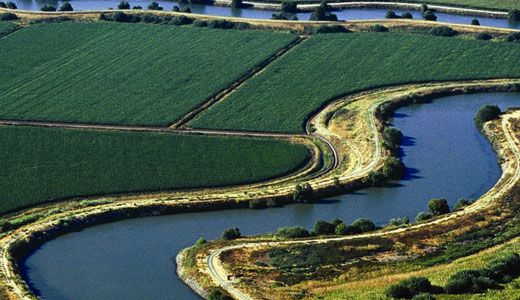Feds Launch Delta Land Grab
OCT. 7, 2010
By KATY GRIMES
The California Legislature has already passed groundbreaking legislation addressing the fragile Delta region, but some California Delta and water experts believe there is a plan to develop a conservancy in the region, as well as restrict water use among state residents.
U.S. Sen. Diane Feinstein, D-CA, and Congressman John Garamendi, D-Walnut Creek, together with a coalition of Northern California Democrats, have proposed Senate Bill S-3927 and companion bill (H.R. 6329), to establish the San Joaquin Delta area as a “National Heritage Area,” under federal authority. But the question remains, why does the state need this?
It can’t be entirely about money; the Delta stands to receive only $2 million per year for 10 years from the federal government. As it currently stands, the Delta region won’t even receive the federal money directly – it will head to legislators first, until there is state legislation to direct it toward the Delta, according to the Delta Stewardship Council.
The Sacramento-San Joaquin Delta has a population of more than 500,000 residents. There are 57 major reclaimed islands and numerous “un-leveed” channel islands. There are 425,700 acres of irrigated agriculture, 64,000 acres made up of of urban and commercial land use, and 61,000 acres of open water, according to the council.
Neither Feinstein’s Washington D.C. office or San Francisco office would discuss details of her bill, nor talk about which local entities or elected officials were involved. Despite a search, the text of the bill not available. The only response received from Feinstein’s office was from Gil Duran, in an email that read, “In response to your inquiry: Senator Feinstein and Congressman Garamendi have been working with local officials in the Delta counties – Yolo, Contra Costa, Sacramento, San Joaquin and Solano – and they have been supportive of the legislation.”
Garamendi, however, is from the Delta and apparently still has family living in the region. According to Michele Gault, District Director of Garamendi’s Antioch office, his bill is for the purpose of establishing the area as a National Heritage area, qualifying it for financial help in the form of federal funds. Gault said, “Both bills came about because a coalition of representatives of the Delta counties (Sacramento, San Joaquin, Yolo, Contra Costa and Solano counties) contacted Feinstein and asked her to introduce legislation, to establish the area as a National Heritage Area, to be operated by the National Parks Service, but managed by the Delta Protection Commission.”
But the National Heritage designation has been in the works for a while, as it was written into 2009 legislation. SBX 1, section 29756.5, states, “The commission may act as the facilitating agency for the implementation of any joint habitat restoration or enhancement programs located within the primary zone of the Delta, including, but not limited to, a national heritage area designation in the Delta.”
SBX1 created the Delta Stewardship Council and was co-authored by Senator Joe Simitian, D-Palo Alto and Sen. President Pro Tem Darrell Steinberg, D-Sacramento. The bill replaced the existing Bay Delta Authority and CalFed Program with “a new governance structure.”
Critics of the bill and even some Capitol insiders warn that Northern California residents will be forced to conserve water far more stringently than Southern California residents. Some have even claimed that Northern California legislators “sold out” to Southern California interests.
Senate analysis of SBX 1 states that the “Public Resources” bill establishes the “twin goals of ecosystem restoration and water supply reliability, creates a new Delta Stewardship Council to develop and implement a Delta plan, creates a new Delta Conservancy to acquire lands and to facilitate ecosystem restoration, and revises the composition and duties of the Delta Protection Commission.”
For Delta residents concerned about the government acquiring land, Garamendi’s bill states, “An owner of private property within the Heritage Area may opt out of participating in any plan, project, program, or activity carried out within the Heritage Area under this section, if the property owner provides written notice to the management entity.”
However, the bill refers to the Omnibus Land Management Agreement Act of 2009, which “designates certain land as components of the National Wilderness Preservation System, to authorize certain programs and activities in the Department of the Interior and the Department of Agriculture, and for other purposes.”
Congress approved the Omnibus Land Management act, which has been called “a massive public lands bill,” that states it “protects two million acres of wilderness in nine states, a thousand miles of rivers, and a 50 percent increase in the wild and scenic river system.” It establishes new national trails, national parks and a new national monument and provides legal status for the National Landscape Conservation System, which will protect some of the country’s most spectacular landscapes, including 700,000 acres in California, according to Rep. Nancy Pelosi. But there are no specifics available for how the land is to be acquired, or how the new parks, riverfront and trails will be established.
Garamendi’s legislation would authorize $20 million – $2 million in any single fiscal year – to the California Delta Protection Commission to implement the National Heritage Area, with up to 50 percent federal cost-share for improvement projects.
Last October (2009), the Delta Counties Coalition wrote a letter to Sen. President Pro Tem Darrell Steinberg, stating their support of the water and Delta legislation, but included concerns about “some serious gaps” in the legislation’s protection of the Delta. Included as concerns were water supply and quality for the five counties, flood control, ecosystem restoration, sustained Delta communities and economy and “senior water rights.”
Chief among the concerns was “veering from the mission of protecting the Delta, because of amendments to the conservancy language.” The coalition was also vehemently critical of the diminished standing of the Delta Protection Commission with regard to its relationship to the Delta Stewardship Council, because, “now the DSC will have the discretion to decide whether to accept comments of the Coalition.”
Eric Alvarez, communications director with the Delta Stewardship Council, was not sure how the federal legislation would affect the council’s jurisdiction. The Delta Stewardship Council Web site states that “the Council is charged with protecting the Sacramento-San Joaquin Delta and the critical role it serves in the water supply for millions of Californians and its unique ecosystem and way of life.”
But the mission of the Delta Protection Commission “is to adaptively protect, maintain, and where possible, enhance and restore the overall quality of the Delta environment consistent with the Delta Protection Act, and the Land Use and Resource Management Plan for the Primary Zone. This includes, but is not limited to, agriculture, wildlife habitat, and recreational activities. The goal of the Commission is to ensure orderly, balanced conservation and development of Delta land resources and improved flood protection.”
Alvarez said that the Delta Stewardship Council was created to be an umbrella over all Delta issues including, but not limited to, levee repair, estuary restoration and the Delta smelt. Alvarez explained the Stewardship Council’s “coequal goals” of providing a more reliable water supply for California and protecting, restoring, and enhancing the Delta ecosystem.
Don Notolli, a Sacramento County Supervisor, was appointed to the Delta Stewardship Council in February 2010 as chair of the Delta Protection Commission, demonstrating some apparent crossover of the agencies. Notolli was a signer on the Delta Counties Coalition letter to Steinberg, as well.
Notolli explained that the Feinstein/Garamendi legislation “will provide higher visibility for the Delta issues. The National Heritage designation is a way to help work with local counties to bring some support for local efforts.”
But some in the region see it as an imposition on property rights. Notolli said, “Feinstein convened county meetings with local folks to talk about problematic elements, and came up with the-opt out clause in the legislation.” (Editor’s Note: We’ve been unable to access Feinstein’s legislation, but the clause is in Garamendi’s bill)
Notolli explained the differences between the two Delta agencies: The Delta Stewardship Council is more of a state focus, with members appointed by the governor, Senate and Assembly, and the Delta Protection Commission is made up of local and area representatives, with an eye on the region’s specific issues.
As for the $2 million a year to be received from the federal government, Notolli said that the money would most likely go to promoting additional tourism, marketing efforts, to the “buy local” campaign and some of the money would go to the planning effort.”
However, the money will go directly to legislators unless and until legislation is written designating the source to receive the federal funds, according to Alvarez.
When asked if the state needs the federal involvement, Notolli said that there is already heavy federal involvement in the Delta region. “As the legislation moves forward, there is a five year sunset on it,” said Notolli. “If nothing comes of the Delta plan, the legislation will sunset.”
Phone calls and requests for information about the Delta Heritage plan’s effects on local counties were made to many of the involved parties in the region, and not many calls were returned, including calls to Susan Bonilla, Contra Costa County Board of Supervisor, and member of the Delta Counties Coalition, and Sen. Mark DeSaulnier’s office, a Democrat Contra Costa legislator.
Assemblywoman Alyson Huber’s office reported that it did not have much information about the Delta heritage area plan. Huber states that one of her biggest issues is the Delta and Northern California water issues.
Co-sponsors of the Feinstein and Garamendi legislation are Democrats Sen. Barbara Boxer, Rep. Doris Matsui, Re. Jerry McNerney, Rep. George Miller and Rep. Mike Thompson.
Related Articles
Bipartisan support building to curb “policing for profit”
Proponents of a measure to close a loophole that allows local law enforcement agencies to seize citizens’ property without a criminal
Jailbreak: Ruling Could Spark Crime Wave
This article first appeared in the new City Journal California Web site. MAY 25, 2011 By HEATHER MacDONALD If the
Big Brother IRS is watching you on Twitter and Facebook
April 8, 2013 Just in time for the government’s favorite day of the year: April 15. When they gouge us





